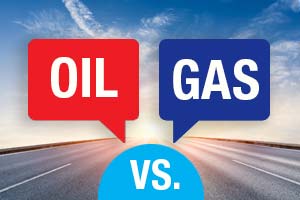There are lots of great reasons why oil and natural gas are two of the most popular fuels used for home heating and comfort services in the country. But how much do you know about each one? We’ve compiled some of the facts about oil and natural gas to help you learn more and make the best decision if you ever need to choose which one might be best for you to use in your home.
Cost, Efficiency & Energy Savings
- Depending on where you live, the cost of heating oil has traditionally been cheaper 5 out of the past 7 years, or more depending on what state you live in
- Gas heating conversion, involving tank abandonment or removal, plumbing, electrical, chimney work and ducting could run as high as $9,000†
- The Consumer Energy Council of America (CECA) recently stated “it’s financially unwise for consumers to convert from oil to gas heat.”
- Oil heat is provided by many companies, all actively engaged in a highly competitive industry
- Gas heat is provided by one big utility – with no choice and no competition
- On average, heating oil burns about 16% more efficiently than gas††
- Efficiency ratings of new oil heat appliances range from 83% to 95% and can have an average life expectancy of 30 or more years if they are properly maintained vs. the average life expectancy of a gas furnace of 11-14 years
- Heating oil equipment upgrades to a more energy-efficient system pays for itself over a short time, adds value to a home and provides more efficient residential warmth than gas
- The hot water recovery rate of an oil-fueled water heater is twice as fast as a gas water heater and three times as fast as an electric water heater
- Oil creates 140,000 BTUs of heat per gallon while a gallon equivalent of Natural Gas produces 100,000 BTUs (Source: www.cityfuel.net)
- You burn approximately 40% more natural gas to receive the same heating equivalent as heating oil (Source: www.cityfuel.net)
Safety
- Heating oil is not explosive and heating oil only ignites by an advanced burning system within an oil-burner or furnace
- Inhalation of fumes is not fatal — unlike gas, which is known as ‘the silent killer’ and is the leading cause of death from carbon monoxide poisoning in the U.S. — there’s a low possibility of carbon monoxide entering the home from oil**
- System malfunctions produce clear warning signs like smoke, odors or even soot before releasing carbon monoxide, gas heating systems give you no warning of carbon monoxide production or release
Going Green
- Over the past 20 years, the sulfur content of heating oil has been reduced by over 93%* and today’s heating oil is 95% cleaner than it was in 1970
- Oil burners emissions have been reduced to near zero levels, reducing overall emissions by 95%*
- In 2004, Oil and Energy issued a report that heating oil is more environmentally friendly in terms of emissions
- When properly adjusted and maintained, new oil heat systems create absolutely no soot, dirt or odors in the home*
Supply & Reliability
- Despite global unrest or any natural disasters, there is still an abundance of long lasting crude oil and world oil reserves
- No dependence of one nation or region for oil supplies, the U.S. is the world’s third largest oil producing country – half of petroleum resources are domestic and our largest supplier of crude oil outside the U.S., is Canada
- Oil lets you control your own personal oil supply – stored on your own property plus you choose how to use and conserve your supply as you need it
- Some areas may only have a single natural gas provider. Our technicians and customer service teams all live and work where you do, so you enjoy better customer service and more local options.
If you have any other questions about which is best for you, contact us today and one of our team will be able to help you make an informed decision. We can take care of any of your heating oil system installation, repair and service needs.
*Source: Oil Heat Powered By Clearburn Science. The Clear Choice! NORA (National Oil Heat Research Alliance)
**Source: Energy Answers Today Pocket Guide by Primedia www.energyanswerstoday.com
†Source: Energy Answers Today – Your Guide to Economical & Efficient Home Heating Brochure by Primedia
††US Department of Energy and the Gas Appliances Manufacturers Association


